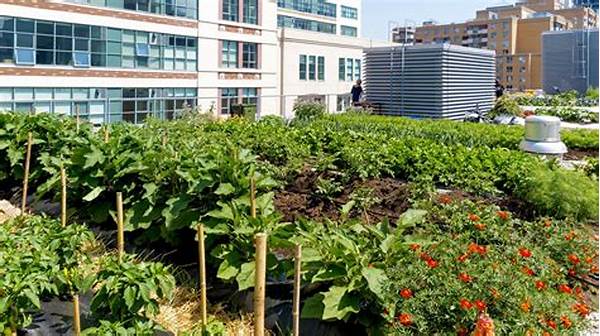As traditional farming faces the ever-growing challenges of space limitation, environmental changes, and increasing urbanization, innovative solutions like urban farming community support systems have come to the forefront. These systems are not merely about growing plants; they represent a movement toward sustainability, healthy living, and community resilience. By transforming urban spaces into thriving ecosystems, urban farming communities can significantly impact food accessibility, environmental health, and local economies. Investing in urban farming community support systems is a step toward a healthier and more sustainable future for cities.
Read Now : Biodegradable Jute Floor Decor
The Importance of Urban Farming Community Support Systems
Urban farming community support systems are essential for revitalizing urban spaces. These systems turn unused city areas into productive landscapes, providing fresh and healthy produce to local communities. In a world where sustainable solutions are necessary, urban farming community support systems offer a powerful tool for reducing the urban food footprint. Imagine a community where fresh produce is no longer a luxury but a norm. Urban farming allows citizens to participate in food production, fostering a sense of community and responsibility toward the environment. By supporting these systems, cities can address food deserts, promote health, and boost economic resilience.
Furthermore, urban farming community support systems play a pivotal role in education and awareness. They offer a platform for learning about sustainable agriculture practices, encouraging city dwellers to reconnect with the origins of their food. As urban residents develop a deeper understanding of food cultivation, they begin to value sustainability and prioritize eco-friendly choices. This educational aspect not only empowers individuals but also strengthens community bonds through shared goals and collaborative efforts. Urban farming transforms passive consumers into active participants in a city’s food ecosystem, propelling an entire community toward a greener future.
Finally, urban farming community support systems can significantly contribute to environmental conservation. By creating green spaces, they help reduce the urban heat island effect, improve air quality, and support biodiversity. These systems also facilitate rainwater harvesting and waste recycling, enhancing a city’s overall sustainability. With the growing threats of climate change, these contributions are more critical than ever. Supporting urban farming community systems allows cities to become more resilient, adaptive, and environmentally friendly in the face of global challenges.
Key Components of Urban Farming Community Support Systems
1. Community Engagement: Urban farming community support systems thrive on active community involvement. Engaging local residents ensures that the farming initiatives meet the community’s needs while fostering a sense of ownership.
2. Educational Programs: These systems often include workshops and training sessions, empowering residents with the knowledge and skills to cultivate their crops, thereby promoting food literacy and sustainability.
3. Access to Resources: Successful urban farming community support systems require access to essential resources such as land, water, seeds, and tools. Equitable distribution of these resources ensures all community members can participate.
4. Collaborative Networks: Building strong networks among local businesses, governmental bodies, and non-profit organizations strengthens urban farming efforts, offering diverse resources and expertise.
5. Sustainability Practices: Integrating sustainable practices like composting, rainwater harvesting, and organic farming can optimize urban farming efforts, creating closed-loop systems that benefit the environment.
Challenges Faced by Urban Farming Community Support Systems
Urban farming community support systems are not without challenges. Space constraints in densely populated areas can limit growth and expansion. Despite these hurdles, creative solutions like rooftop gardens and vertical farming provide innovative ways to maximize urban space for farming purposes.
Read Now : Sophisticated Minimalist Lighting Designs
Policy barriers often pose another significant challenge to urban farming community support systems. Navigating local regulations can be complex, requiring advocacy and collaboration with policymakers to develop supportive policies for urban agriculture. Overcoming these challenges ensures long-term viability and growth for urban farming initiatives.
Success Stories of Urban Farming Community Support Systems
In cities worldwide, several urban farming community support systems have successfully transformed urban landscapes. These successes illustrate the potential for urban farming to foster community engagement and environmental resilience. For instance, Detroit’s urban farms have turned vacant lots into productive green spaces, reducing food insecurity and enhancing community pride. Similarly, Havana’s urban agriculture initiatives showcase how urban farming community support systems can contribute to food sovereignty and economic stability.
Such stories are testimonies to the power of urban farming community support systems to create meaningful change. By learning from these successes, other cities can be inspired to initiate or expand their urban farming efforts, building a legacy of sustainability for future generations.
The Role of Technology in Urban Farming Community Support Systems
The integration of technology in urban farming community support systems has revolutionized urban agriculture. By leveraging smart farming technologies, cities can enhance productivity and efficiency. For example, data-driven insights can optimize water usage and improve crop yields, making urban farms more sustainable. Technological innovations such as hydroponics and aquaponics have also enabled urban farming in areas with limited soil access.
Moreover, technology enhances collaboration and information sharing among urban farmers, lending to more resilient and informed communities. By incorporating technology, urban farming community support systems can overcome traditional barriers, making urban agriculture accessible and effective.
Future of Urban Farming Community Support Systems: A Conclusion
The future of urban farming community support systems promises an exciting and sustainable path forward for city landscapes. By fostering community engagement, advancing technological integration, and promoting sustainability, these systems stand to reshape urban living fundamentally. As urban areas continue to grow, expanding urban farming initiatives will be crucial in addressing food security, environmental sustainability, and community wellbeing.
Urban farming community support systems present an innovative approach to urban challenges, merging ecological care with community development. By championing these systems, cities can transform into vibrant, sustainable environments where nature and urban living coexist harmoniously. Supporting urban farming is not merely about food production—it’s about fostering thriving, sustainable communities.





